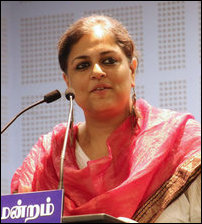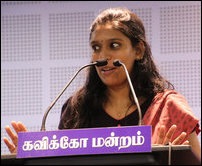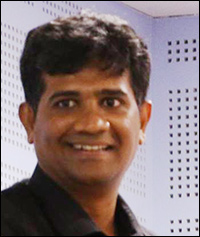Sivaram commemorated in Tamil Nadu on 10th anniversary of his assassination
[TamilNet, Thursday, 30 April 2015, 10:29 GMT]
The 10th death anniversary of assassination of Senior Editor at TamilNet, an Eezham Tamil intellectual, journalist, political analyst and activist Dharmeratnam Sivaram (Taraki) was marked on Tuesday in Chennai. Sivaram, beside his profound love for his people, was a genuine internationalist who dedicated his life and writing- to quote him in his own words, “…to create a body of knowledge to help oppressed people all over the world help themselves to get out from under oppression; to disseminate this body of knowledge.” A decade after his assassination by the hands of the Sri Lankan state, Eelam and much of the oppressed nations of the world which he espoused solidarity with and desired to aid are still beleaguered and subjected to counter-insurgency perpetuated by their respective oppressor states aided by world powers.
காணுரை உள்ளது.
http://www.tamilnet.com/art.html?catid=79&artid=37745
The 10th death anniversary of assassination of Senior Editor at TamilNet, an Eezham Tamil intellectual, journalist, political analyst and activist Dharmeratnam Sivaram (Taraki) was marked on Tuesday in Chennai. Sivaram, beside his profound love for his people, was a genuine internationalist who dedicated his life and writing- to quote him in his own words, “…to create a body of knowledge to help oppressed people all over the world help themselves to get out from under oppression; to disseminate this body of knowledge.” A decade after his assassination by the hands of the Sri Lankan state, Eelam and much of the oppressed nations of the world which he espoused solidarity with and desired to aid are still beleaguered and subjected to counter-insurgency perpetuated by their respective oppressor states aided by world powers.
காணுரை உள்ளது.
http://www.tamilnet.com/art.html?catid=79&artid=37745

Journalist
Revati Laul, who visited North-East in early 2013 as a special
correspondent at Tehelka. Ms Revati also worked for NDTV

News
X associate Editor Journalist Priyamvatha Panchapagesan, who did an
award winning documentary on witnessing the genocide on Eezham Tamils
after a field trip to North-East in 2011

Dr Ezhilan Nagathan
It is in this light that Sivaram’s
work and his analysis of geo-politics and the oppressors’ use of
counter-insurgency from the perspective of the oppressed remains of the
greatest salience, in illuminating for the oppressed how establishments
approach them and edifying them on how to counter these processes.
The commemoration event held Tuesday night in Kaviko Mandram in Chennai was organized by Forum for Media Solidarity, a civil society organization striving for creating a common space among journalists and activists in Tamil Nadu. The coordinators of the forum who organized the event were Bharathy, Karthick, Sathya Chelliyan and Niyas Ahmed. The host, S.A. Sufiyan emphasised how Sivaram was not only a fighter through the pen, but a guerrilla who became a revolutionary writer.
The key speakers who participated were journalist Revati Laul (served as special correspondent at Tehelka and NDTV), journalist Priyamvatha Panchapagesan (News X associate editor), journalist Radhika Sudhakar, Aazhi Senthil Nathan, Thirumurugan Gandhi, coordinator of May 17 movement and Dr. Ezhilan Naganathan, the founder of I'laignar Iyakkam (Youth Organization).
Revati Laul made the investigative documentary ‘The War May Be Over But The Idea Lives On’ which covered aspects of occupied Eelam in 2013. She emphasised in her speech that journalists should share their coverages and stories to overcome the limitations imposed by media administration, the state and corporates.
Aazhi Senthil Nathan in his speech corroborated that the significance of Sivaram for Eezham and Tamils was only truly absorbed after his assassination and in particular in the context during and following Mu'l'livaaykkaal, when various powers were united in annihilating the Tamil national liberation movement. He noted how Sivaram had already elucidated in an article from 2005 the counter-insurgency policies and its international dimensions pursued by the Sri Lankan state. He concluded his speech by remarking that Sivaram remains a beacon in the present in illuminating how the field of struggle had turned into that of creating awareness through writing. He also urged Tamils to cultivate Think Tanks and also enhance coordination between journalists.
Journalist Priyamvatha, who made the investigative documentary ‘I Witnessed Genocide’ for Headlines Today said she had done the documentary “to expose what is happening in Ilangkai in a neutral manner”.
She recounted the story of a malnourished Tamil mother she had met clandestinely in a disclosed area in Ki'linochchi, who told her in tears that she did not even have milk to feed her infant, “All this despite claims by the international community and the UN that they are providing assistance”. She also noted how she heard eyewitness accounts of the deliberate usage of cluster bombs and chemical bombs by the Sri Lankan State during the Mu'l'livaaykkaal war in 2009, and in its aftermath the deployment of mass rape against Tamil women in the welfare camps. She furthered “Why has there been no response from the International community?”
She also said that journalists in India need to fight to follow up on their stories and to cultivate long term involvement, pointing out Sri Lanka as a region they need to focus on.
She noted how the Sri Lankan state had and still does maintain a tight media blockade preventing the truth regarding the conditions faced by Eezham Tamils from being exposed to the outside world. She concluded by stating “Taraki lived and breathed in the conflict zone, which made me realize, why Indian journalists are maintaining a silence on the ground situation.”
Thirumurugan Gandhi, Coordinator of the May 17 Movement elaborated on how Taraki “was a source of knowledge to elucidate and edify us on the geo-politics affecting the Tamils”.
He elaborated that Taraki, was a source to create movements, and held that if Tamil Nadu had been familiar with his work during the genocide in Mu'l'livaaykkaal, the demonstrations in Tamil Nadu would have unfolded differently.
“Taraki was a phenomenal individual, unsurpassed by journalists and political commentators in the region. He has created the model for how a journalist should be in the Third World”, said Thirumurugan. He furthered that Indian journalists, unlike Sivaram, were dependent on State authorities and intelligence services to produce stories, which inevitably were reproductions of the former’s narratives.
He pointed out the differences between N. Ram and Taraki, stating that the former is a model for state centric journalism. Thirumurugan said that N. Ram was also responsible for distorting the truth behind the death of 20 Tamils labourers in Andhra Pradesh.
He concluded that there is a lack of people-centred journalism in India and Tamil Nadu, pointing out the likes of Tehelka, Economic and Political Weekly, and Frontline who all have consistently neglected Eelam.
In contrast Thirumurugan said, “We found people-centred journalism in Eezham, Taraki was a beacon in this regard and this tradition still remains in the case of Eelam Tamils. This was among people facing genocide with all its dangers.”
He concluded by stating that the necessity for Tamil Nadu Tamils to understand the geo-political situation afflicting them through the works of Sivaram.
Dr. Er Ezhilan spoke on the works of Mouhya Chaudhari (NDTV) Revati Laul (Tehalka) and Priyamvatha (Headlines Today) and how the work was made possible with effect of engagement of a few Tamil Nadu youth activists. He urged such engagement of civil society activists should proceed further in all platforms of India to bring the truth and justice. He also urged more coordination between activists and journalist in making possible in-depth journalism.
The commemoration event held Tuesday night in Kaviko Mandram in Chennai was organized by Forum for Media Solidarity, a civil society organization striving for creating a common space among journalists and activists in Tamil Nadu. The coordinators of the forum who organized the event were Bharathy, Karthick, Sathya Chelliyan and Niyas Ahmed. The host, S.A. Sufiyan emphasised how Sivaram was not only a fighter through the pen, but a guerrilla who became a revolutionary writer.
The key speakers who participated were journalist Revati Laul (served as special correspondent at Tehelka and NDTV), journalist Priyamvatha Panchapagesan (News X associate editor), journalist Radhika Sudhakar, Aazhi Senthil Nathan, Thirumurugan Gandhi, coordinator of May 17 movement and Dr. Ezhilan Naganathan, the founder of I'laignar Iyakkam (Youth Organization).
Revati Laul made the investigative documentary ‘The War May Be Over But The Idea Lives On’ which covered aspects of occupied Eelam in 2013. She emphasised in her speech that journalists should share their coverages and stories to overcome the limitations imposed by media administration, the state and corporates.
Aazhi Senthil Nathan in his speech corroborated that the significance of Sivaram for Eezham and Tamils was only truly absorbed after his assassination and in particular in the context during and following Mu'l'livaaykkaal, when various powers were united in annihilating the Tamil national liberation movement. He noted how Sivaram had already elucidated in an article from 2005 the counter-insurgency policies and its international dimensions pursued by the Sri Lankan state. He concluded his speech by remarking that Sivaram remains a beacon in the present in illuminating how the field of struggle had turned into that of creating awareness through writing. He also urged Tamils to cultivate Think Tanks and also enhance coordination between journalists.
Journalist Priyamvatha, who made the investigative documentary ‘I Witnessed Genocide’ for Headlines Today said she had done the documentary “to expose what is happening in Ilangkai in a neutral manner”.
She recounted the story of a malnourished Tamil mother she had met clandestinely in a disclosed area in Ki'linochchi, who told her in tears that she did not even have milk to feed her infant, “All this despite claims by the international community and the UN that they are providing assistance”. She also noted how she heard eyewitness accounts of the deliberate usage of cluster bombs and chemical bombs by the Sri Lankan State during the Mu'l'livaaykkaal war in 2009, and in its aftermath the deployment of mass rape against Tamil women in the welfare camps. She furthered “Why has there been no response from the International community?”
She also said that journalists in India need to fight to follow up on their stories and to cultivate long term involvement, pointing out Sri Lanka as a region they need to focus on.
She noted how the Sri Lankan state had and still does maintain a tight media blockade preventing the truth regarding the conditions faced by Eezham Tamils from being exposed to the outside world. She concluded by stating “Taraki lived and breathed in the conflict zone, which made me realize, why Indian journalists are maintaining a silence on the ground situation.”
Thirumurugan Gandhi, Coordinator of the May 17 Movement elaborated on how Taraki “was a source of knowledge to elucidate and edify us on the geo-politics affecting the Tamils”.
He elaborated that Taraki, was a source to create movements, and held that if Tamil Nadu had been familiar with his work during the genocide in Mu'l'livaaykkaal, the demonstrations in Tamil Nadu would have unfolded differently.
“Taraki was a phenomenal individual, unsurpassed by journalists and political commentators in the region. He has created the model for how a journalist should be in the Third World”, said Thirumurugan. He furthered that Indian journalists, unlike Sivaram, were dependent on State authorities and intelligence services to produce stories, which inevitably were reproductions of the former’s narratives.
He pointed out the differences between N. Ram and Taraki, stating that the former is a model for state centric journalism. Thirumurugan said that N. Ram was also responsible for distorting the truth behind the death of 20 Tamils labourers in Andhra Pradesh.
He concluded that there is a lack of people-centred journalism in India and Tamil Nadu, pointing out the likes of Tehelka, Economic and Political Weekly, and Frontline who all have consistently neglected Eelam.
In contrast Thirumurugan said, “We found people-centred journalism in Eezham, Taraki was a beacon in this regard and this tradition still remains in the case of Eelam Tamils. This was among people facing genocide with all its dangers.”
He concluded by stating that the necessity for Tamil Nadu Tamils to understand the geo-political situation afflicting them through the works of Sivaram.
Dr. Er Ezhilan spoke on the works of Mouhya Chaudhari (NDTV) Revati Laul (Tehalka) and Priyamvatha (Headlines Today) and how the work was made possible with effect of engagement of a few Tamil Nadu youth activists. He urged such engagement of civil society activists should proceed further in all platforms of India to bring the truth and justice. He also urged more coordination between activists and journalist in making possible in-depth journalism.








கருத்துகள் இல்லை:
கருத்துரையிடுக